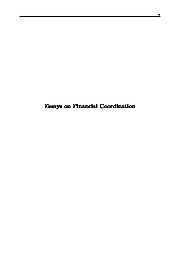Essays on Financial Coordination Defended on Thursday, 17 January 2019
In this thesis, I research on instances when the invisible hand fails to motivate the players to act optimally for the common good of the society. I first explore in the context of trading speed competition. In a theoretical model, I show that when it is decreasing, the market discipline by the technological expenses borne by the traders themselves is not sufficient to curb the speed competition -- the traders would over-invest in speed and exhibit "arms-race behavior''.
Then I did my investigation in the banking context. I show theoretically that higher risk taken by the bank may discourage runs. I demonstrate that this is a result of a common fact in finance: the higher the asset risk, the higher also is the asset upside payoff. Thus a higher asset risk means the asset would pay more when it succeeds, which benefits the depositors if they do not run and hold their deposits until maturity.
In the last part of the thesis, I move to a corporate governance context and set out to empirically test a long held question: do frequent evaluation of the CEO hurt or encourage firm innovation? I show that if given the opportunity to monitor the CEO too frequently, shareholders discipline may make the CEO reluctant to undertake R&D projects that are costly in the short term but valuable in the long term.
Taken together, this thesis shows that the invisible hand may fail to foster the socially optimal when externalities are not fully internalized and when information asymmetry is present.
Keywords
HFT, arms race, bank risk taking, innovation, agency problems















